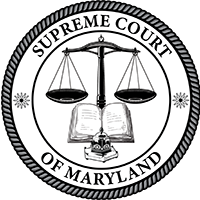SCHEDULE OF ORAL ARGUMENTS
September Term, 2021
Thursday, January 6, 2022:
No. 27 In Re: D.D.
Issue – Criminal Law – 1) Does the scent of marijuana provide reasonable suspicion to conduct an investigatory stop to determine if someone possesses a criminal amount of marijuana or could be cited for civil violations of marijuana laws? 2) Assuming, arguendo, that the stop was constitutional, was the frisk unlawful because the police lacked reasonable suspicion to believe that Respondent was armed and dangerous?
Attorney for Petitioner: Derek Simmonsen
Attorney for Respondent: Michele D. Hall
No. 34 Brandon Gambrill, et al. v. Board of Education of Dorchester County, et al.
Issues – Courts & Judicial Proceedings – 1) Does the federal Coverdell Act, 20 U.S.C. § 7941, et seq., preempt Maryland law and apply to preclude any liability on the part of either school personnel or boards of education in connection with the negligence of teachers and school administrators? 2) Did the federal Coverdell Act shield the individual Respondents from liability for their negligent actions where the Respondents failed to introduce any evidence at all that Maryland accepts the prerequisite federal funding required for the Coverdell Act to apply?
Attorney for Petitioner: Cary Hansel
Attorneys for Respondent: Adam E. Konstas and Andrew G. Scott
No. 31 Michael Farmer v. State of Maryland
Issues – Constitutional Law – 1) As part of a juvenile lifer’s constitutional right to a meaningful opportunity to obtain release based upon demonstrated maturity and rehabilitation, as recognized in Carter v. State, 461 Md. 295 (2018), does a juvenile lifer have a federal constitutional right to state-furnished counsel in proceedings before the Maryland Parole Commission? 2) As part of a juvenile lifer’s constitutional right to a meaningful opportunity to obtain release based upon demonstrated maturity and rehabilitation, as recognized in Carter, does a juvenile lifer have a Maryland constitutional right to state-furnished counsel in proceedings before the Maryland Parole Commission? 3) Assuming a juvenile lifer has a constitutional right to state-furnished counsel in proceedings before the Maryland Parole Commission, does that Maryland Parole system allow for the effective exercise of that right? 4) Is Petitioner’s sentence illegal pursuant to Maryland Rule 4-345(a)?
Attorney for Petitioner: Jeffrey M. Ross
Attorney for Respondent: Jer Welter
Monday, January 10, 2022:
AG No. 103 (2020 T.) In the Matter of the Petition for Reinstatement of Raj Sanjeet Singh to the Bar of Maryland
Attorney for Petitioner: Irwin R. Kramer
Attorney for Respondent: Lydia E. Lawless
Tuesday, January 11, 2022:
No. 30 Seth D. Jedlicka v. State of Maryland
Issues – Constitutional Law – 1) How should a sentencing court evaluate where on the McCullough “spectrum,” Carter v. State, 461 Md. 295 (2018), a juvenile offender falls, and how does that analysis determine what term-of-years sentence or period of parole ineligibility is too long to comport with the Eighth Amendment to the U.S. Constitution and U.S. Supreme Court precedent in Miller v. Alabama, 567 U.S. 60 (2012), and Montgomery v. Louisiana, 136 S.Ct. 718 (2016)? 2) As to juvenile offenders, does the statute, Md. Code § 7-301(d)(2) of the Correctional Services Article, prescribing a mandatory 25 years of parole ineligibility in every case where the State seeks life without parole, violate the Equal Protection Clause and/or the Eighth Amendment? 3) What is the scope of the individualized sentencing requirement for juveniles who have committed homicide and did the lower court err in upholding Petitioner’s concurrent 60 year aggregate term and life suspend all but 60 years sentences, imposed without an individualized sentencing proceeding? 4) Due to a concern that juveniles will be forced to serve disproportionate sentences, should this Court recognize a substantive right for non-incorrigible juveniles to be released, as set forth by the U.S. Supreme Court in Miller and Montgomery interpreting the Eighth Amendment? 5) Did the lower court err in finding that a life sentence in Maryland is not the functional equivalent of life without parole, even though the structure of the Maryland parole system allows offenders to be diverted from parole to clemency?
Attorney for Petitioner: Robert W. Biddle
Attorney for Respondent: Jer Welter
AG No. 6 Attorney Grievance Commission of Maryland v. Natalie Thryphenia Collins
Attorney for Petitioner: Jessica B. McCully
Attorney for Respondent: Natalie Thryphenia Collins
No. 26 Kenyatta M. Smith v. State of Maryland
Issues – Criminal Law – 1) When a petitioner satisfies the substantive requirements for receiving coram nobis relief – i.e., they have exhausted all other available remedies, have proven that the convictions they are challenging suffer from constitutional or other fundamental error, and have established that the challenged convictions create a significant collateral consequence – to what extent does the petitioner still need to show that there are “compelling circumstances” warranting relief? 2) Where Petitioner met the established prerequisites for obtaining coram nobis relief, did the circuit court err in ruling that, under dicta in Coleman v. State, 219 Md.App. 339 (2014), there are not “compelling circumstances” to vacate Petitioner’s convictions because, inter alia, the legislative purpose behind the creation of Petitioner’s significant collateral consequence (i.e., her inability to obtain a license as a mortgage originator) takes precedence?
Attorney for Petitioner: Michael T. Torres
Attorney for Respondent: Karinna M. Rossi
SUZANNE C. JOHNSON
CLERK
Pursuant to the December 27, 2021 Interim Administrative Order of December 27, 2021 Restricting Statewide Judiciary Operations in Light of the Omicron Variant of the COVID-19 Emergency and the June 18, 2018 Administrative order on the Implementation of Remote Electronic Participation in Judicial Proceedings, and the December 28, 2021 Eighth Administrative Order on Remote Oral Arguments, the Court will hear oral arguments in these cases by videoconferencing.

